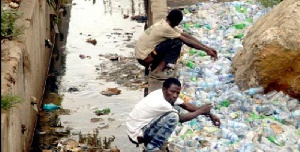
As Ghana continues to grapple with one of its most persistent public health challenges, President John Dramani Mahama has issued a stark warning: open defecation in 2025 is unacceptable.
Speaking during the launch of Ghana’s 2025 Voluntary National Review (VNR) for the Sustainable Development Goals (SDGs), the president condemned the ongoing crisis and emphasized the urgent need for reform.
“It is unacceptable that in 2025, open defecation persists in parts of Ghana,” Mahama stated, calling for a crackdown on building permits issued without toilet facilities. He stressed that the nation’s sanitation crisis is less about awareness and more about failures in investment, enforcement, and community engagement.
His remarks echo long-standing calls from civil society organizations, including WaterAid Ghana, the Media Coalition Against Open Defecation (M-CODe), and the Ghana Water and Sanitation Journalists Network (GWJN), who have repeatedly pushed for comprehensive reform. These groups insist that no structure should be approved without proper sanitation infrastructure.
However, the issue goes beyond lax enforcement.
Experts point to fragmented regulatory systems, underfunded local governance, weak coordination, and minimal private sector participation as key obstacles.
In 2022, WaterAid warned that at the current pace, Ghana would not achieve universal household toilet access until 2103.
The public health implications are severe. Recurrent cholera outbreaks and other sanitation-related illnesses disproportionately affect vulnerable communities. “Without access to basic toilets and hygiene, people remain trapped in a vicious cycle of illness, lost productivity, and deepening poverty,” warned Ewurabena Yanyi-Akofur, Country Director of WaterAid Ghana.
Sanitation is not a siloed issue—it’s fundamental to achieving over 70% of all SDG targets, impacting everything from health and education to gender equity and climate resilience.
To accelerate progress, WaterAid has advocated for greater private sector involvement, especially in rural regions where latrines are often destroyed by poor soil and harsh weather.
Innovations in construction, maintenance, and sanitation marketing could revolutionize rural hygiene infrastructure.
President Mahama’s promise to direct 80% of the District Assemblies Common Fund (DACF) to district governments, with 10% allocated for water and sanitation, is seen as a positive move. Yet, local authorities often lack the resources and skills to transform funding into lasting impact.
There is an urgent need to improve accountability mechanisms such as the District Performance Assessment Tool (DPAT), which has been criticized for its ineffectiveness.
Stakeholders are now calling for revised indicators, greater transparency, and inclusion of civil society in performance tracking.
The ongoing constitutional review also offers a unique opportunity to reset institutional responsibilities, ensuring clearer mandates for sanitation policy, planning, and enforcement.
As the debate over sanitation reform intensifies, Mahama’s call must be treated as a nationwide rallying cry.
“Sanitation is dignity.
It is health. It is equity.
Ghana can’t afford to wait any longer,” Yanyi-Akofur concluded.
For Ghana, the real deadline is not 2103—it is now.



